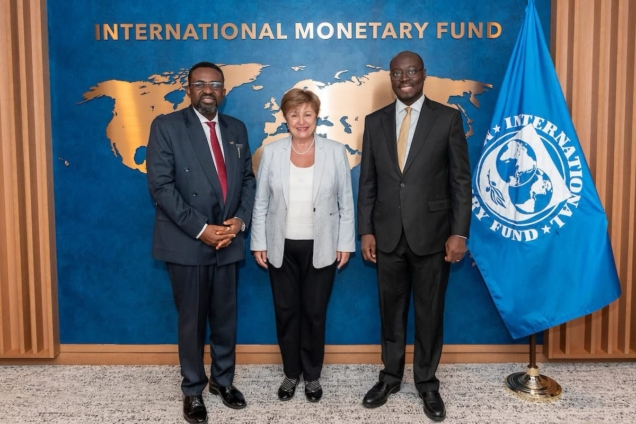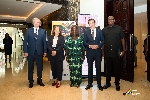IMF expected to reach staff-level agreement with Ghana on fifth programme review today
 IMF boss with Ghanaian officials
IMF boss with Ghanaian officials
The International Monetary Fund (IMF) is expected to conclude its Fifth Programme Review with Ghana today, October 10, 2025, with indications pointing toward a staff-level agreement.
This projection follows a detailed analysis by Joy Business' recent economic performance, benchmarked against the key targets of the IMF-supported Extended Credit Facility (ECF).
The review highlights significant progress across several macroeconomic fronts, including inflation, debt restructuring, fiscal management, and financial stability.
Data reviewed by Joy Business show that Ghana has made measurable progress on major IMF performance indicators. Inflation, once among the country’s biggest challenges, has now fallen to single digits—helped by the Bank of Ghana’s continued efforts to control liquidity and stabilise the exchange rate.
The ongoing debt restructuring process and reforms in the energy and financial sectors have also supported macroeconomic stability, while GDP growth has outperformed earlier projections.
Based on these gains and trends from prior programme assessments, analysts anticipate that the IMF will announce a staff-level agreement, paving the way for Executive Board consideration and approval.
If approved, Ghana could access the next tranche of support—estimated at just over US$360 million—in the coming days. This would bring total disbursements under the programme to roughly US$1.56 billion.
The IMF mission, led by Dr. Ruben Atoyan, began its review on September 29, 2025, holding extensive consultations with officials from the Ministry of Finance, the Bank of Ghana, and Parliament.
Key meetings were also held with Dr. Johnson Asiama, Governor of the Bank of Ghana, and Dr. Cassiel Ato Forson, Minister of Finance.
Discussions reportedly centred on several core areas:
Clearance of outstanding arrears
Completion of audits for 2024’s public expenditure
Assessment of the recent policy rate cuts by the Bank of Ghana
Review of foreign reserve build-up and dollar market interventions
This fifth review—seen as the penultimate one under Ghana’s three-year IMF programme—is especially significant.
Analysts note that maintaining fiscal discipline beyond the programme’s conclusion in May 2026 will be critical to preserving the gains achieved so far.
The IMF’s review, which covers data up to June 2025, is expected to evaluate:
Sustained inflation control and reserve adequacy
Fiscal performance and primary surplus adjustments
Recapitalisation needs of weaker private and state-owned banks
Arrears accumulation in statutory funds such as NHIL, GETFund, and the Road Fund
Social spending gaps and measures to protect vulnerable households
The IMF Executive Board approved Ghana’s current US$3 billion (SDR 2.242 billion) Extended Credit Facility (ECF) arrangement on May 17, 2023, to help restore macroeconomic stability, ensure debt sustainability, and foster inclusive growth.
The programme aims to:
Restore public finances through stronger revenue mobilisation and efficient spending
Enhance structural reforms in tax policy, energy, and public financial management
Sustain low inflation by curbing monetary financing and maintaining exchange rate flexibility
Strengthen financial stability and support private-sector-led growth
Under the ECF, Ghana received an initial disbursement of US$600 million, with subsequent tranches released every six months following successful reviews.
Source: Classfmonline.com/cecil Mensah
Trending Business

GIPC explores investment partnerships with Greece in manufacturing and renewable energy
15:07
Ghana unveils US$3.4 billion plan to become continental leader in renewable energy
12:54
Interior Ministry gives bullion-van operators 45 days to meet new national safety standards
12:52
Parliament approves Health Ministry’s GH¢S 2.8bn budget, highest allocation so far
12:45
GIPC courts German investors with new economic incentives and industrial growth agenda
11:56
Inflation declines to 6.3% for Nov, 11 months in a row
12:57
Transport Ministry: Airport passenger service charge increased to GHS100
07:13
ASSMA's one-week ultimatum threat to mining sector peace, stability - Ghana Chamber of Mines
22:23
Ghana showcases breakthrough in regional power integration at 2025 West Africa Energy Cooperation summit
15:17
NPA recognised as key gov't agency championing national standards
14:09




